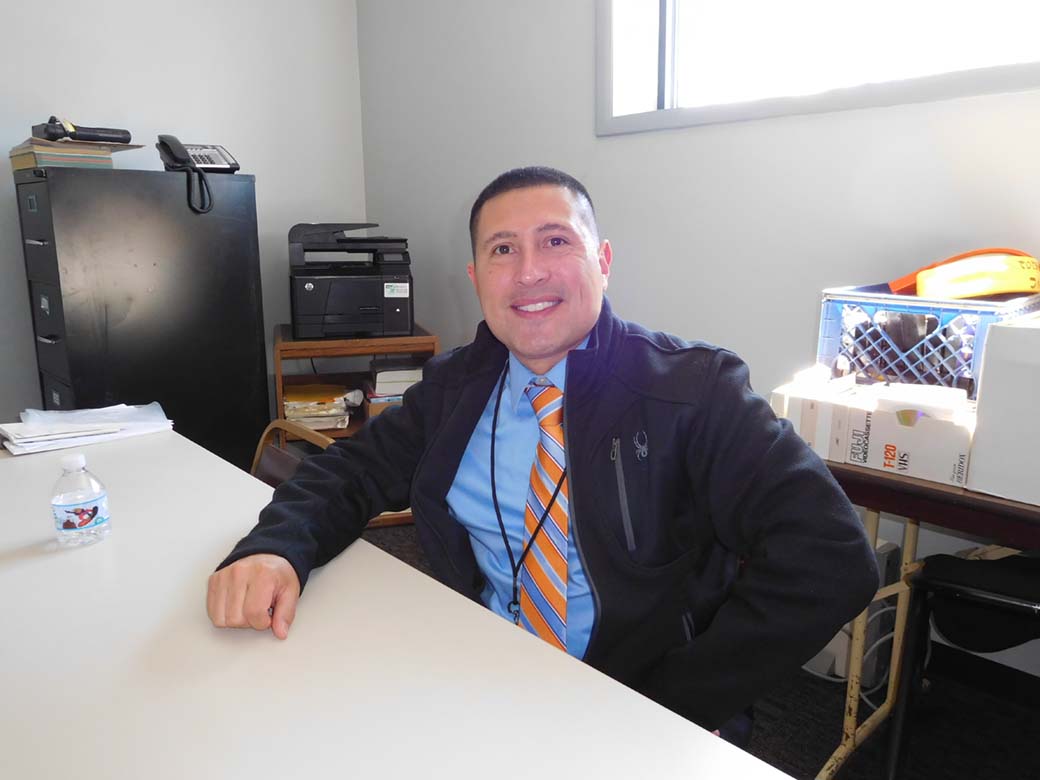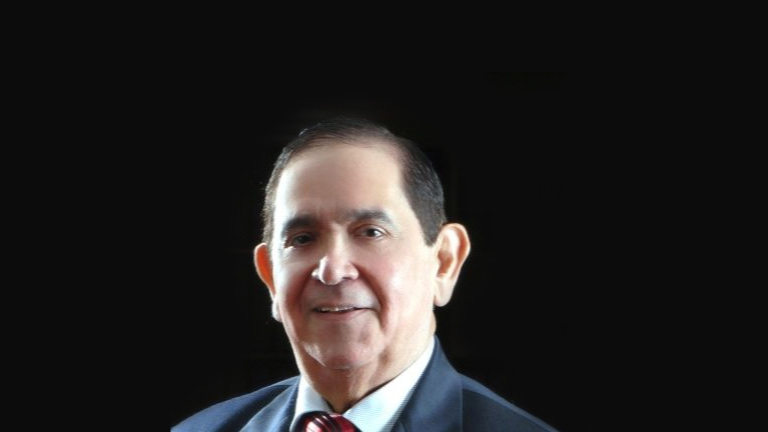[:en]
When it was time for him to choose a career, Sargent Nicholas Yanez never doubted he wanted to be part of the Police Department: “Ever since I was little, I always knew I wanted to help people in my community.” Yanez, who is originally from Texas, first served his country in the Air Force and he later decided to settle in a city where the services of a bilingual police officer were needed.
This was possible because his mother was born in Colorado while his father was born in Mexico City, which meant Yanez grew up while immersed in both cultures, acknowledging the value of speaking English and Spanish.
“Public service has always been one of my top priorities,” said Yanez, who enrolled at the Omaha Police Academy in the 1990s: “Back then Texas had several bilingual police officers, but I noticed that there weren’t enough officers who spoke both languages and who could help the many Latino people who were arriving – this made it easier for me to get a job.” For someone aspiring to have a career like Yanez, he has a piece of advice: “Lead a clean life and help people all the time. It doesn’t matter if you’re only 12 years of age, you must know how to help others.” On top of this, Yanez emphasized that having good grades at school is a must, as well as “respecting authority, be that from a teacher or our parents.”
And even though the Omaha Police Department (OPD) accepts applicants with a secondary school level education, for Yanez “there is nothing better than coming prepared with a college education.”
Even though it’s a dangerous profession, Sargent Yanez acknowledges he has never thought about quitting: “For me, this is the best job in the world, and God has given me a beautiful family!”
After 22 years of marriage, with a wife who supports him in all of his commitments and three gorgeous girls at home, Yanez goes out on the streets giving it his all as the person in charge of the Robbery Unit: “Theft is a tricky issue since it is a crime that can affect anyone and that can’t be fully prevented in our daily life – even I have been the victim of theft.”
In order to avoid it there are certain things you can do, such as having your car keys in hand as you exit work, especially at night, check the surrounding area and avoid any distractions, such as using your cellphone: “This doesn’t mean you should leave in fear, it means you should take precautions.”
On that note, the many years of experience of Sgt. Yanez have given him a solid perspective on reality: “People who commit theft are looking for an easy target, someone who won’t be giving them any trouble.”
Unfortunately, because of this, women and young people are the most vulnerable ones: “If someone has already been the victim of theft, the best thing they can do is be a good witness. This means remembering all the information of the incident and calling 911 right away.”
According to Sgt. Yanez, crimes like these are not common on the streets of Omaha, but they do happen at stores and banks: “We are talking about theft with violence or with some type of intimidation.”
And then there is carjacking with describes the violent theft of a vehicle: “These cases can be very dangerous, and it is advised that the victim surrenders the vehicle without any resistance or without trying to fight since their life is in danger.”
Speaking of vehicles, Sargent Yanez shared an alarming statistic: “In 2013, there were 38 accidents in Nebraska caused by teenagers at the wheel, and in the same year there were 653 accidents in which the driver was using his/ her cell phone.”
For 2015 the numbers increased and stats show that, in Nebraska, there were over 4,000 accidents in which the driver was not focused on the road, and 12 of them had fatal consequences: “The United States National Security Council said that every year there are over 1.6 million accidents in the country in which the driver was using his/her cellphone while driving. One in every four traffic accidents at the national level was caused because someone was texting while driving.”
To conclude, Yanez sent a message to the community, particularly to young people: “Please don’t use your cellphone to text while driving. Stats show that 11 teenagers die every day because of this.”
Sgt. Nicholas Yanez / OPD
[:es]
Cuando llegó el momento de elegir una profesión, el Sargento Nicholas Yanez jamás dudó en formar parte del Departamento de Policía: “Siempre quise ayudar a la gente desde que era pequeño, ayudar en todo lo posible a mi comunidad”.
Originario de Texas, Yanez primero sirvió a su país en la Fuerza Aérea y después buscó establecerse en una ciudad donde fueran necesarios los servicios de un oficial bilingüe.
Esto debido a que su madre nació en Colorado y su papá en la Ciudad de México, así que Yanez creció inmerso en ambas culturas, reconociendo el valor de hablar inglés y español.
“El servicio público siempre estuvo hasta arriba de mis prioridades”, expresó Yanez quien ingresó a la Academia de Policía de Omaha en los noventas: “En ése entonces Texas tenía suficientes policías bilingües, pero me di cuenta que aquí no habían muchos oficiales que hablaran los dos idiomas como para ayudar a la gente hispana que llegaba cada vez más; así que eso me facilitó el conseguir mi trabajo”.
Para quien actualmente aspira a una profesión como la de Yanez, su consejo es: “Llevar una vida limpia y ayudar a la gente todo el tiempo. No importa si apenas tienes 12 años, debes saber cómo es el servir a los demás”.
Aunado a ello, Yanez enfatizó que el obtener buenas calificaciones en la escuela es fundamental al igual que “respetar a la autoridad, ya sea a los maestros o nuestros padres”.
Y aunque el Departamento de Policía de Omaha (OPD) acepta a aspirantes con estudios a nivel secundaria, para Yanez “no hay nada como llegar bien preparado asistiendo previamente a la universidad”.
Si bien su profesión es peligrosa, el Sargento Yanez reconoció que jamás ha pensado en claudicar: “¡Para mi es el mejor trabajo de todo el mundo y además Dios me dio una familia preciosa!”.
Después de 22 años de matrimonio, con una esposa que lo apoya en todos sus compromisos y con tres preciosas hijas en su hogar, Yanez sale a las calles a dar lo mejor de sí mismo al frente de la Unidad Anti-robo: “El tema del robo es bien difícil porque es un crimen que le puede pasar a cualquiera y que no se puede prevenir al cien por ciento en cada día de nuestras vidas puesto que incluso yo puedo ser también víctima de un robo”.
Para evitarlo hay muchas medidas que se pueden tomar como el tener las llaves del auto a la mano al salir del trabajo, mayormente en la noche, checar el entorno y evitar distracciones como el uso del celular: “Claro que no se trata de vivir con miedo pero si, de tomar precauciones”.
En ése sentido, los años de experiencia del Sargento Yanez le han hecho partícipe de una realidad: “Quienes cometen robos están buscando a una víctima fácil, alguien que no les vaya a dar problemas”.
Por ello las mujeres y los jóvenes en general, desafortunadamente suelen ser los más vulnerables: “Si alguien ya fue víctima de un robo lo mejor que puede hacer es ser un buen testigo. Esto significa recordar toda la información del incidente y llamar al 911 de inmediato”.
Según el Sargento Yanez robos semejantes no son comunes en las calles de Omaha, pero si lo son los asaltos a tiendas y bancos: “Estamos hablando de robo cuando alguien usa fuerza o intimidación para obtener algo de una persona”.
Por otra parte, el llamado carjacking se tipifica como aquel robo violento donde alguien utiliza la violencia para despojar a otro de su auto: “Estos casos pueden ser muy peligrosos y lo aconsejable es que la víctima entregue el vehículo y no ofrezca resistencia o quiera pelear pues su vida está de por medio”.
Al hablar de cuestiones vehiculares, el Sargento Yanez discutió un tema alarmante: “Estadísticamente en el 2013 en Nebraska se registraron 38 accidentes ocasionados por adolescentes que manejaban distraídos, y ése mismo año hubieron 653 accidentes donde el conductor usaba un teléfono celular”.
Para el 2015 las cifras aumentaron puesto que en Nebraska hubieron 4 mil accidentes provocados por un conductor que no estaba enfocado en el camino y 12 de éstos tuvieron consecuencias fatales: “El Consejo Nacional de Seguridad en los Estados Unidos dijo que anualmente se documentan 1.6 millones de accidentes en el país, donde el conductor utilizaba el teléfono celular al momento de ir al volante. Y uno de cada cuatro accidentes de tráfico a nivel nacional es causado por alguien que manejaba mientras enviaba mensajes de texto”.
Para concluir, Yanez envió un mensaje a la comunidad, dirigido mayormente a los jóvenes: “Por favor, no usen su celular para enviar mensajes cuando conducen. Las estadísticas señalan que 11 adolescentes mueren diariamente a consecuencia de esto”.
Sgto. Nicholas Yanez / OPD
[:]




